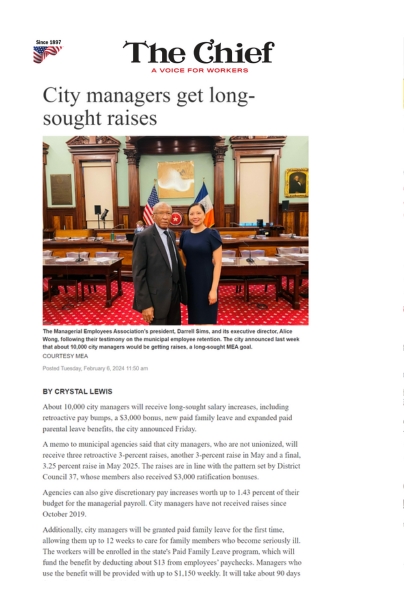The city announced last week that about 10,000 city managers would be getting raises, a long-sought MEA goal. Story from The Chief by Crystal Lewis. February 9.
Article below. Link to the article, also available here.

About 10,000 city managers will receive long-sought salary increases, including retroactive pay bumps, a $3,000 bonus, new paid family leave and expanded paid parental leave benefits, the city announced Friday.
A memo to municipal agencies said that city managers, who are not unionized, will receive three retroactive 3-percent raises, another 3-percent raise in May and a final, 3.25 percent raise in May 2025. The raises are in line with the pattern set by District Council 37, whose members also received $3,000 ratification bonuses.
Agencies can also give discretionary pay increases worth up to 1.43 percent of their budget for the managerial payroll. City managers have not received raises since October 2019.
Additionally, city managers will be granted paid family leave for the first time, allowing them up to 12 weeks to care for family members who become seriously ill. The workers will be enrolled in the state’s Paid Family Leave program, which will fund the benefit by deducting about $13 from employees’ paychecks. Managers who use the benefit will be provided with up to $1,150 weekly. It will take about 90 days for workers to be enrolled in the program, the city’s announcement said.
The workers will also see the amount of time they can take paid parental leave double, from six weeks to 12. The change is expected to take effect immediately.
Managers can’t bargain
The Managerial Employees Association, which advocates for thousands of city managers who by law cannot collectively bargain, recently pushed for their members to receive fair raises, including through a Chief op-ed.
“This is a very positive action that boosts employee morale. MEA looks forward to continuing discussions and developing collaboration with City Hall to address other important work-life improvements in an effort to limit disparities between Managerial and Original Jurisdiction Employees and the unionized municipal workforce,” the MEA’s president, Darrell Sims, said.
Sims noted that the raises and benefits, instituted by a so-called mayor’s personnel order, also called for funding for recruitment, retention and merit increases.
The raises and new benefits are at least in part designed to increase retention among city workers amid the current staffing shortage. Mayor Eric Adams believed that the benefits would make the city a more competitive employer.
“My mother worked multiple jobs and raised six kids on her own in New York City. The city didn’t do its part to help support our working-class family, but this administration will not continue the same mistakes of the past,” he said in a statement. “Expanding parental leave for city workers and paid leave for those with a sick family member are not only important changes to retain the talent that keeps our city moving — they are the right things to do to ensure our administration continues to help support the average working-class family in this city.”
The administration also noted that the expanded parental leave option will help address pay disparities faced by women in the workforce.
In order to retain workers, the city in October announced that DC 37’s remote work pilot program would be expanded to non-union managers. The employees have been able to work from home up to two days a week since Dec. 1. The program for both DC 37 members and non-unionized employees is set to last until May 31, 2025 but could be extended an additional year.
The raises are expected to cost $2.1 billion through Fiscal Year 2028, but have been fully funded through the city’s reserve fund, Politico reported. The additional parental leave benefits will cost $2.5 million annually.
